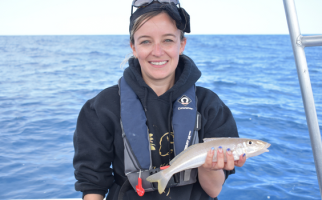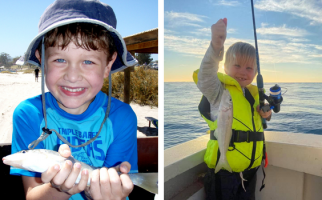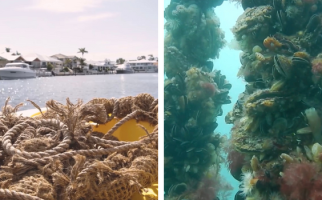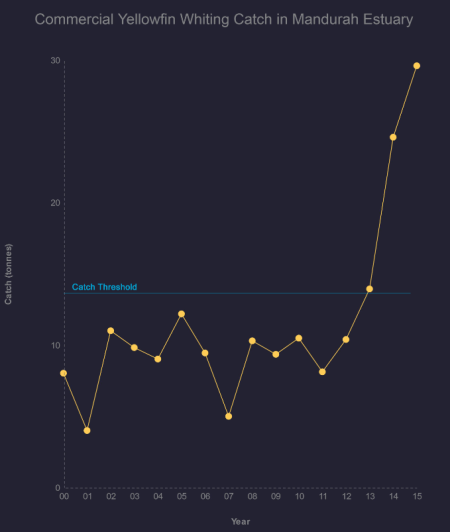Sand whiting
Sillago vittata
Eating: 4.5 stars
ID – Narrow bars of brown spots across the back.
The ubiquitous sand whiting. Rarely the target of a day’s fishing, but prolific, fun to catch and fantastic eating, as well as decent bait.
Actually officially known as western school whiting as we don’t get true sandies in WA, they are a staple of WA fishing despite their low profile. They don’t get the love of their larger King George and yellowfin relatives, but are still an important fish in our waters.
I have fond memories of some fun trips off the northern suburbs of Perth a few years ago, in a friend’s boat, drifting in 10-20m of water and catching a magnificent feed of sand whiting (along with the odd goatfish and many tiny little flatties that were very spiky!).

A simple paternoster rig with a heavy enough sinker to get to the bottom and a couple of small hooks was all that was needed, along with some little pieces of squid for bait. However, their main food source is actually small crustaceans. Other bait options include coral prawn and whitebait. The durability of squid on the hook takes some beating though and that means you are not baiting up again every few moments.
We caught loads of sandies this way, often catching multiple fish at a time, and the fillets were beautiful, especially when you got fish around the 30cm mark. Sandies grow to about 35cm, and certainly get quite plump at that size. Their delicate white flesh is a treat on the plate.
Of course, sandies aren’t just an offshore species either and any beach angler who has wet a line in the surf as far north as Geraldton has caught them. Sometimes the little ones are in plague proportions right at your feet, picking at baits meant for much bigger fare.

A little flick rod and small baits can mean some great fun while waiting for the bigger fish to bite. It’s especially enjoyable fishing for kids, as there is no need for long casts or heavy tackle. Not to mention that fresh sandies are an ideal bait for bigger surf predators such as mulloway, tailor and salmon.
It does seem that the better class of sandies are usually in that slightly deeper water though. We get some really nice ones in Albany’s King George Sound, and the shipping channel into Cockburn Sound is noted for them.
Drifting likely ground is a productive approach and you will find patches of fish, but you could also anchor once you encounter some action. At the end of the day, no one in the house will complain if you return with a feed of fresh sand whiting!


 Recfishwest was heavily involved in the establishment of the harvest strategy for this fishery. This strategy was put in place to provide the public with confidence that community owned resources are being effectively managed.
Recfishwest was heavily involved in the establishment of the harvest strategy for this fishery. This strategy was put in place to provide the public with confidence that community owned resources are being effectively managed.